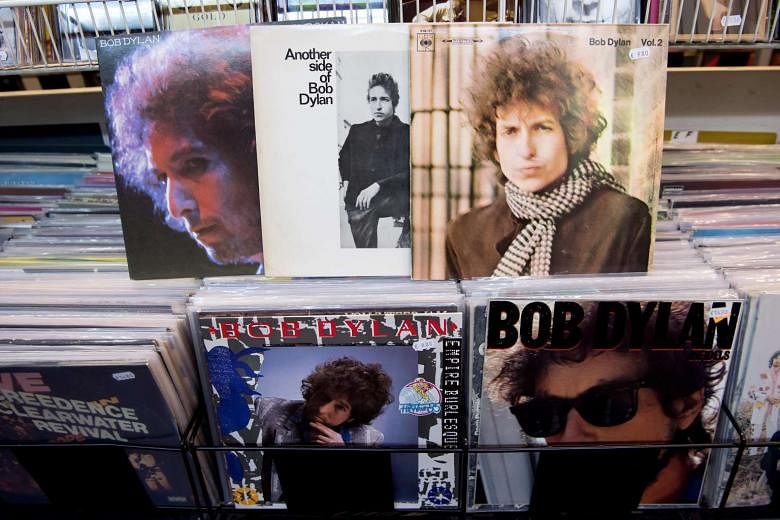PARIS (AFP) - To say that singer Bob Dylan's lifting of the Nobel prize for literature came as a shock to the literary establishment is something of an understatement.
With the Syrian poet Adonis and the Kenyian novelist and critic Ngugi Wa Thiong'o widely seen as favourites if not shoo-ins, Dylan's triumph sparked a mixture of horror, head scratching and elation.
"Dylan's name has often been mentioned over the past few years but we always thought it was a joke," said the French novelist Pierre Assouline, who could not hide his fury at the Nobel committee.
"Their decision is contemptuous of writers," he told AFP. "I like Dylan but where is the (literary) work? I think the Swedish Academy have made themselves look ridiculous."
With three of the giants of American letters - Philip Roth, Joyce Carol Oates and Don De Lillo - still waiting for the Nobel nod, and past greats such as Jorge Luis Borges ignored in their lifetimes, other writers were also quick to put the boot in.
Scottish novelist Irvine Welsh of Trainspotting fame took to Twitter to skewer the choice of the 75-year-old folk singer.
"I'm a Dylan fan, but this is an ill-conceived nostalgia award wrenched from the rancid prostates of senile, gibbering hippies," he wrote.
The Indian-born British novelist Salman Rushdie - often cited as a possible Nobel winner himself - was rather more magnanimous.
"Great choice," he tweeted. "From Orpheus to (the Pakistani poet) Faiz, song and poetry have been closely linked," he adding, echoing the statement of the Nobel jury.
"Dylan is the brilliant inheritor of the bardic tradition."
Oates too, a fervent social media user, implied she had not been waiting with bated breath for a call from Oslo. She congratulated Dylan saying he was "an inspired and original choice.
"His haunting music and lyrics have always seemed, in the deepest sense, 'literary'," she tweeted.
However, she went on to say that the Beatles would have been "equally deserving... if one is thinking of quasi-pop music icons.
"Recall," she added, "that Bob Dylan named himself for great 20th-century poet Dylan Thomas, who did not win the Nobel but might well have, like Robert Frost."
Sixties legend singer Marianne Faithfull could not contain her pride at Dylan's victory, telling AFP she was "very proud" of her old friend.
"I think he's one of the greatest artists in the world and he's changed our whole lives with his writing and his poetry."
And she was scornful of the writers criticising the choice. "I think they're ridiculous," she said.
Dylan's victory, however, raises questions about what constitutes literature.
Must it still be confined to poetry and fiction given that last year's Nobel winner was a journalist, Svetlana Alexievich? Or should the definition also been extended to all those who like Dylan use language to play with the emotions?
For the acclaimed Congolese writer Alain Mabanckou, literature's frontiers can be more elastic.
"The purists and the begrudgers will certainly scream sacrilege (that Dylan won), and claim a slackness of thinking on the part of the Nobel academy," he told AFP.
"But I am happy that literature has also recognised the lyric, in the poetic sense of the term," said the Los Angeles-based novelist.
But having said that he was "satisfied" Dylan deserved the Nobel, he said the late great French songwriter "Georges Brassens should have too".
The novelist Philippe Margotin, co-author of the international best-seller Bob Dylan All The Songs: The Story Behind Every Track, is in no doubt that the author of Like A Rolling Stone is "the great living poet of 20th-century America".
He claimed Dylan's literary credentials were impeccable. "He was an avid reader of the (19th-century) poets Arthur Rimbaud and William Blake. And naturally he was inspired by the poets of the Beat Generation.
"Of the 500 songs he has written, some are less musically important, but every time the text is absolutely sublime," he insisted.
Nevertheless, Dylan has been often criticised for the opacity of much of his work, which sometimes can seem so personal as to defy interpretation.
As a writer in the traditional sense, his output has been rather sparse. Dylan wrote a collection of stream of consciousness poetry called Tarantula at the height of his fame, which got a critical mauling when it was published in 1971.
He had a warmer reception for his bestselling Chronicles in 2005, the first part of what was billed as three-part memoir. His millions of fans are still waiting for the final two instalments to appear.

